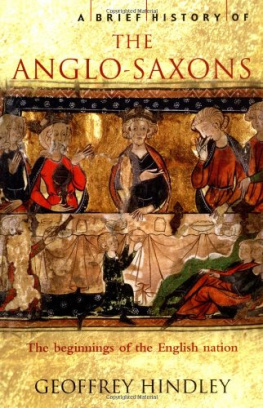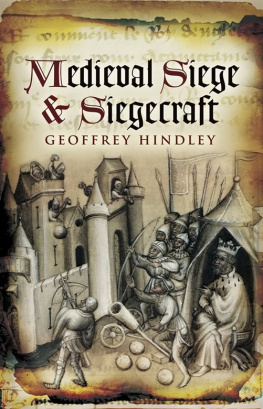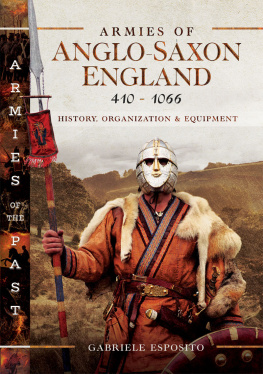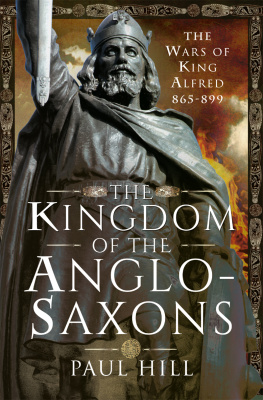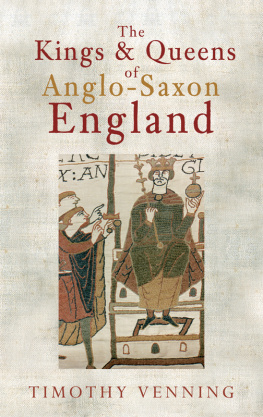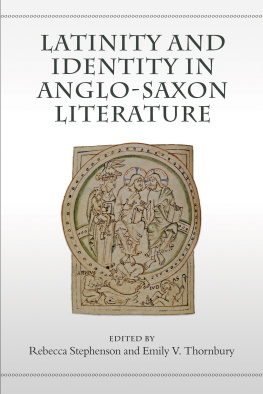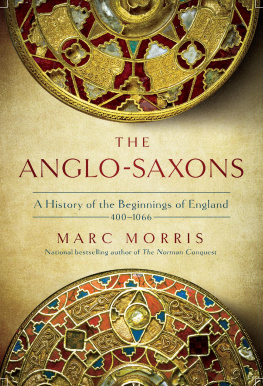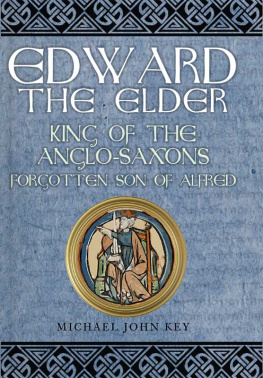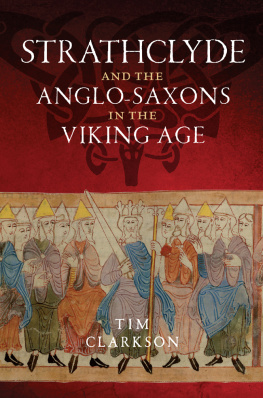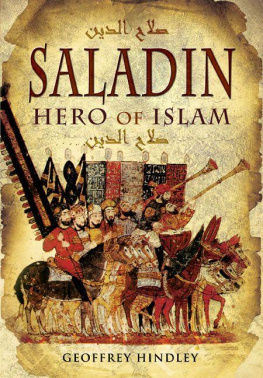GEOFFREY HINDLEY, educated at University College, Oxford is a lecturer and writer. He was three times an invited participant at the International Congress on Medieval Studies at Kalamazoo, and has regularly lectured in Europe and America on Medieval social history, European culture and the history of music. From 1994 to 2000 he taught English civilization at the University of Le Havre. He is also President of the Society for the History of Medieval Technology and Science of Oxford and London. His many books include The Shaping of Europe, Saladin: A Biography, England in the Age of Caxton, The Book of Magna Carta and A Brief History of the Crusades. He lives in Peterborough, England.
Praise for Geoffrey Hindleys A Brief History of the Crusades
We are clearly entering a new phase of an old war. Hindleys book fills in the historical background to it and should be widely read.
Paul Johnson, Mail on Sunday
Hindleys accomplished book is informative, never descending into the sensational but not avoiding the horrors either.
Good Book Guide
Hindleys book magnificently explores the motives of knights and peasants... and presents an heroic tapestry of Europe on the move.
Oxford Times
Other titles in the series
A Brief History of 1917: Russias Year of Revolution
Roy Bainton
A Brief History of the Birth of the Nazis
Nigel Jones
A Brief History of the Boxer Rebellion
Diana Preston
A Brief History of British Kings & Queens
Mike Ashley
A Brief History of British Sea Power
David Howarth
A Brief History of the Celts
Peter Berresford Ellis
A Brief History of the Cold War
John Hughes-Wilson
A Brief History of Christianity
Bamber Gascoigne
A Brief History of the Circumnavigators
Derek Wilson
A Brief History of the Crusades
Geoffrey Hindley
A Brief History of the Druids
Peter Berresford Ellis
A Brief History of the Dynasties of China
Bamber Gascoigne
A Brief History of Fighting Ships
David Davies
A Brief History of Globalization
Alex MacGillivray
A Brief History of the Great Moghuls
Bamber Gascoigne
A Brief History of the Hundred Years War
Desmond Seward
A Brief History of Infinity
Brian Clegg
A Brief History of Medicine
Paul Strathern
A Brief History of Mutiny
Richard Woodman
A Brief History of Napoleon in Russia
Alan Palmer
A Brief History of Painting
Roy Bolton
A Brief History of the Royal Flying Corps in World War I
Ralph Barker
A Brief History of Science
Thomas Crump
A Brief History of the Tudor Age
Jasper Ridley
A Brief History of the Vikings
Jonathan Clements
A BRIEF HISTORY OF
THE ANGLO-SAXONS
GEOFFREY HINDLEY
ROBINSON
London
Constable & Robinson Ltd
5556 Russell Square
London WC1B 4HP
www.constablerobinson.com
This edition published by Robinson,
an imprint of Constable & Robinson Ltd, 2006
Copyright Geoffrey Hindley 2006
The right of Geoffrey Hindley to be identified as the author of this
work has been asserted by him in accordance with the
Copyright, Designs and Patents Act 1988
All rights reserved. This book is sold subject to the condition that it shall not, by way of trade or otherwise, be lent, re-sold, hired out or otherwise circulated in any form of binding or cover other than that in which it is published and without a similar condition including this condition being imposed on the subsequent purchaser.
A copy of the British Library Cataloguing in
Publication data is available from the British Library
ISBN-13: 978-1-84529-161-7
ISBN-10: 1-84529-161-1
eISBN: 978-1-47210-759-6
Printed and bound in the EU
1 3 5 7 9 10 8 6 4 2
To Diana
CONTENTS
ACKNOWLEDGMENTS
Since the publication of the second edition of Peter Hunter Blairs An Introduction to Anglo-Saxon England in 1977 (reprinted in 2003 with a new introduction and updated bibliography), there has been a wide range of books, articles and journals on all aspects of Anglo-Saxon history and culture. This Brief History has drawn on this wealth of publications as well as the classic work of scholars such as Frank Stenton and Dorothy Whitelock to present a rounded and, to the best of my ability, up-to-date account of the history, language and literature of what was undoubtedly one of the most formative cultures in Britain and Europe. Of the many distinguished scholars to whose work I am particularly indebted, I would like to mention here: James Campbell, Simon Keynes, the late Patrick Wormald, Michael Lapidge, John Blair, Pauline Stafford, Rosamond McKiterrick, Timothy Reuter, David Rollason and David Hill. Many others are acknowledged in the notes and bibliography.
More personal thanks go to my editors at Constable and Robinson, Becky Hardie and Claudia Dyer; to the specialist reader; and to David Rose who copy-edited the entire text with great thoroughness; to Christopher Shaw for reading the page proofs and Helen Peters, to whom I am indebted for the index. For those errors that remain, I am of course to blame.
A number of the pictures used are thanks to the generous help of my friends Gordon Monaghan and Rex Winsbury, who made many special journeys in pursuit of photographs of crosses and eagles, statues and churches. For some of the artwork that enriches the plates, I am gratefully in the debt of Mr Monaghan, a celebrated draughtsman in the world of stained glass design, who works in partnership with his wife Yvonne.
Finally I would like to say thank you to the staff of Cambridge University Library; the staff of Peterborough Museum and Art Gallery; the Peterborough Central Library; and the staff at Yaxley Library, in Cambridgeshire, for their expertise and assistance.
A NOTE ON NAMES AND MEASUREMENTS
Spellings and place names
The territory we now call France covered, during the Anglo-Saxon period, various regions with different names, for example Gaul, Neustria, West Francia or Frankia. Like other writers in this field, I have done my best to tread a rational path through the minefield of usage. In the last case both spellings are found in recent literature. On the assumption that the usage derives from a Latin formation and that Latin at the time still used the letter C for the consonantal K, and having no other letter, I have adopted the spelling Francia, though the word would no doubt have sounded like Frankia.
Personal Names
When it comes to the spelling of Anglo-Saxon and Scandinavian personal names and transliterations from Old English, Old Norse or Danish usage, one finds a rich diversity of modern variants. From thelred/Ethelred, Eiric/Erik, Sweyn/Swein, to Cnud/Cnut (even the somewhat old fashioned Canute) and so forth. Alfred/lfred is the classic example. One of the recent biographies of the king refers to him throughout as Alfred while the book jacket features a manuscript in Old English where the name is clearly shown as lfred. It seems to me that Alfred is the inevitable choice here. In other cases I have endeavoured to follow what one might call best practice in the knowledge that common usage may change by the end of this decade. Within the last decade, two major books have been published on the leading dynasty of Wessex nobility: the title of one concerns the Godwins, the other, the Godwines. I have adopted Weland the Smith in place of the Wayland for the name of the figure of pagan legend. A note about Egbert or Ecgberht: it is now increasingly common to find the spelling Ecgberht, not only because it is more true to the original but also because in Anglo-Saxon ecg sounds like edge not egg.
The Scandinavian raiders appear as Vikings even though it is likely that viking may have originated as a generic term for a young raider or pirate. Technically, the lower case spelling might seem preferable. In fact, I have followed the predominant convention and capitalized it.
Next page
